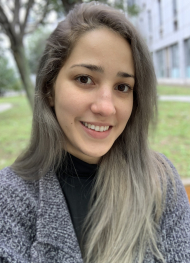Feindel Brain and Mind Seminar Series: High-Dimensional Neural Mass Models with Distributed-Delay Connectome Tensors

La série Feindel Brain and Mind Seminar s’inscrit dans la ligne de pensée du Dr William Feindel (1918-2014), directeur du Neuro de 1972 à 1984, qui consiste à maintenir un lien constant entre pratique clinique et recherche. Les présentations porteront sur les dernières avancées et découvertes en neuropsychologie, en neurosciences cognitives et en neuro-imagerie.
Les scientifiques du Neuro, ainsi que des collègues et collaborateurs venus du milieu ou du monde entier, se chargeront des conférences. Cette série se veut un forum virtuel pour les chercheurs et les stagiaires en vue de favoriser les échanges interdisciplinaires sur les mécanismes des troubles cérébraux et cognitifs, leur diagnostic et leur traitement.
Pour participer en personne, inscrivez-vous ici
Pour visionner la diffusion sur Vimeo, cliquez sur le lien suivant
Anisleidy Gonzalez Mitjans
Chercheuse post-doctorale, Centre d'imagerie cérébrale, Université McGill, Le Neuro
Hôte: justine.clery [at] mcgill.ca (Justine Clergy)
Abstract: The Jansen and Rit Neural Mass Model (JR NMM) serves as a concise yet potent framework for comprehending the dynamics within a cortical column and its interactions with the thalamus. While adept at simulating diverse neural processes and applied in the exploration of phenomena related to epileptic seizures and brain-computer interfaces, the existing algorithms encounter challenges in scaling with an increasing number of neural masses. This limitation hampers real-time feedback and impedes the applicability of Neural Mass Models (NMMs) in resolving EEG/MEG inverse problems. To address these issues, this study introduces a novel approach along with a Distributed-delay Neural Mass Model (DD-NMM) Toolbox, grounded in three pivotal aspects: i. Preservation of Network Dynamics: Leveraging the Local Linearization Method (LLM), numerical methods that may disrupt network properties (attractors) are circumvented. ii. Decoupling of Neural Mass Integration: Enhancing the simulation sampling frequency facilitates treating inputs to each neural mass as exogenous. This, in turn, streamlines the symbolic solution of the corresponding equations. iii. Efficient Input Computation: Employing a differential algebraic formulation, a tensor product is utilized between past outputs of all masses and the Connectome Tensor (CT). This innovative approach creates the present input to each NMM, allowing for the modeling of various connectivities and delays, including distributed delays. Through these advancements, this work aims to overcome the scaling challenges faced by current algorithms, paving the way for enhanced real-time feedback and the broader application of NMMs in tackling EEG/MEG inverse problems.






